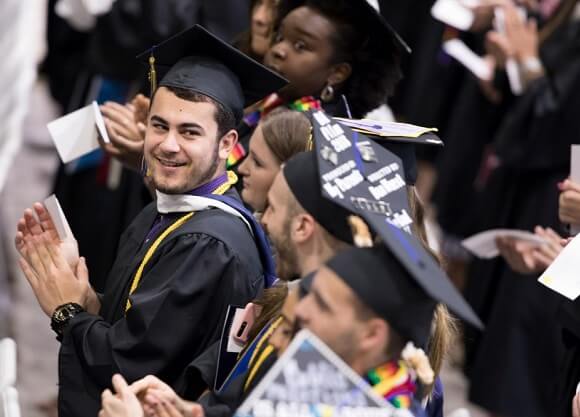
Communications graduates urged to embrace and learn from failure
May 20, 2018

May 20, 2018

Mohn, who joined NPR four years ago after a distinguished career in radio and television, was awarded an honorary doctor of humane letters before addressing our graduates.
“I hope you learned that it isn’t just the technical skills you need. What will set you apart and give you an edge are your powers of creativity, critical thinking and new ideas. That will be your secret sauce and something artificial intelligence will have a hard time replacing.”
Embrace failure, Mohn urged.
Just days after being fired as executive vice president and general manager at MTV, HBO called to ask him to head a television network called Movietime.
“They had been trying to fill the job for nine months. No one would take the job,” he said. “For me, it was the chance to become a CEO and get an ownership stake in a cable TV network, so I took it.”
Mohn would eventually re-launch Movietime as E! Entertainment Television, and considers it the move that made his career.
“Failure is guaranteed. Everyone here will fail, more than once — personally and professionally. I wish that weren’t so. It crushes some people. It motivates others. How are you going to manage your failures? Does failure become your narrative or your catalyst?” he asked.
Jayline Tapia ’18 addressed her fellow graduates. Tapia recalled on the last day of spring break during her sophomore year, she received a text message saying her younger brother had been shot. Two hours later, he died.
“I felt as though the ground had completely collapsed right beneath my feet. I took a week off to grieve with my family, but then I came back. And believe me when I tell you, that was the hardest thing I’ve ever had to do,” she said.
Tapia credited her professors and friends at Quinnipiac with supporting her as she mourned the death of her brother and completed her college education.
“We made it. We made it to the spot that seemed so incredibly far away, the spot that so many others wanted to get to but couldn’t, and we did this as a community — together.”
“Do not take this chance you were given for granted. Life really is an improvisation," Tapia said. "We really don’t have any idea what’s going to happen next, so live your life to the absolute fullest. Take advantage of the opportunities you are given. Stand tall and strong and do not look back.”
Elizabeth Natale ’79 delivered the Alumni Welcome to the graduates.
The School of Communications Commencement was the fourth of six undergraduate ceremonies the university hosted on May 19 and 20. In all, there were 1,626 undergraduate degree candidates from six schools:
353 in the College of Arts and Sciences
430 in the School of Business
186 in the School of Communications
65 in the School of Engineering
440 in the School of Health Sciences
217 in the School of Nursing
In addition, Quinnipiac awarded a total of 1,244 degrees to graduate, law and medical students on May 12 and 13.
Quinnipiac Today is your source for what's happening throughout #BobcatNation. Sign up for our weekly email newsletter to be among the first to know about news, events and members of our Bobcat family who are making a positive difference in our world.
Sign Up Now